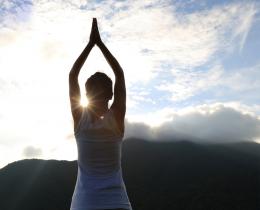With a masters degree in electrical and computer engineering from the University of Wisconsin-Madison along with an MBA, Silicon Valley was calling. Avenelle left New Orleans for a job as a product manager in California.
“I had just learned that I had a very important customer that was not very happy," she says. "The VP of my division scheduled a call with me, the sales manager, and a few other people. I took the call during my morning commute and immediately felt the tension."
The VP’s questions began to sound more like growling statements. The line was eerily quiet and Avenelle took the next exit off the freeway. Then, the VP began to curse, channeling his anger at the muted sales rep. Avenelle stiffened as tears fell from her eyes and held her breath as he barked orders.
“Finally, I hung up and let out a howling cry.”
It was in this moment, Avenelle knew her anxiety would not magically disappear.
“Pain and trauma lives in our body and flows through energetic vibrations," she says." This pain wasn’t just in my head. My life and identity was so wrapped up in my job. By Sunday evening, I was in a panic state fueled by fear.”
How Yoga Works to Calm Your Nerves
Over the next decade, Avenelle’s practice evolved, revealing calm amid chaos. She had experienced firsthand how anxiety could impact her physical and mental health and, with time, she began to see how yoga was a highly effective tool for managing her anxiety.
A study by the Beckman Institute at the University of Illinois Urbana-Champaign confirms Avenelle's experience. Their virtual eight-week yoga program geared toward full-time working adults resulted in overall decreases in stress and anxiety. The trial, which appeared in the Journal of Behavioral Medicine, led participants through three self-paced remote yoga workouts each week and assessed levels of stress and anxiety in addition to executive functioning.
Another study dug even deeper into the science behind how yoga helps with anxiety, depression, and even post-traumatic stress disorder (PTSD) by looking at the mechanism by which yoga increases self-regulation.
Another Way
As a former Silicon-Valley engineer and recovering perfectionist, Avenelle came to understand that she was in the perfect place to relate to others suffering from anxiety and stress. As she notes on The Anxious Yogi, anxiety disorders are now the most common mental illness in the US, and and two in five people report symptoms of anxiety or depression.
"It is why I pulled on the side of the freeway that day and why I finally left the world of tech to become a healer, a yoga instructor, and educator. I do this work, so others don’t have to suffer alone. Sometimes I get anxious. And that’s okay."
As part of her mission to bring ease and healing to others, Avenelle created ANXXY, an online gathering space to explore the most effective mind-body tools used to heal bodies and minds impacted by chronic stress, trauma, and anxiety. Her practice and teaching continue to evolve through a trauma-informed, anti-oppressive, and all-body-loving lens.
“Yoga transformed my life by showing me another way. A way to live in balance and harmony with the universe. A way to hold space and offer support without betraying yourself.” Avenelle says. "Breathing, relaxing, feeling, watching through the difficult moments in life, allows the mystery to heal us."




